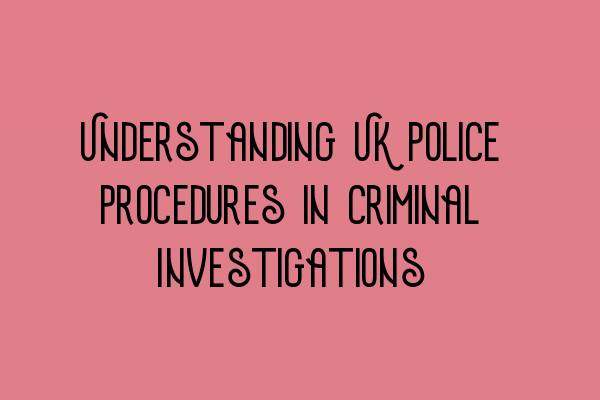Understanding UK Police Procedures in Criminal Investigations
In the criminal justice system, the role of the police is crucial in conducting investigations and gathering evidence to bring offenders to justice. To gain a comprehensive understanding of UK police procedures in criminal investigations, it is essential to delve into the processes involved.
Arrest and Detention
When the police have reasonable grounds to believe that a person has committed an offense, they have the power to arrest and detain the individual. The arrest is made under specific circumstances defined by the law, ensuring that the person’s rights are protected throughout the process. It is important to note that the police can only detain an individual for a reasonable period of time without charging them, after which they must either release the person or bring them before a court.
Investigation and Evidence Gathering
During the investigation phase, the police will gather evidence to support their allegations. This can include collecting witness statements, conducting interviews, analyzing CCTV footage, and collecting physical evidence from crime scenes. The police work closely with forensic experts and other professionals to ensure the accuracy and reliability of the evidence collected. The gathering of evidence is an essential part of building a strong case against the accused.
Interviewing Suspects
When a suspect is arrested, they have the right to remain silent and seek legal representation. The police must inform the suspect of their rights and provide them with the opportunity to consult with a solicitor. Interviews conducted by the police are crucial in obtaining information and admissions from suspects. It is important that the police conduct interviews in accordance with the legal framework to ensure the admissibility of evidence in court.
Charging and Bail
If the police have gathered enough evidence to support the allegations, they can charge the suspect. Once charged, the suspect will be brought before a court where they will have the opportunity to enter a plea. Depending on the circumstances, the court may grant bail to the accused, allowing them to be released from custody until their trial. The decision regarding bail is made based on various factors, including the seriousness of the offense and the likelihood of the accused appearing in court.
Conclusion
Understanding UK police procedures in criminal investigations is crucial for both legal professionals and individuals involved in criminal cases. By familiarizing oneself with these procedures, it becomes easier to navigate the criminal justice system. It is important to consult qualified legal professionals who specialize in criminal law to ensure that your rights are protected throughout the process.
For further assistance and preparation for the SQE exams, we offer comprehensive courses and resources to help you succeed. Check out our related articles below:
- SQE 1 Practice Exam Questions
- SQE 1 Practice Mocks FLK1 FLK2
- SQE 2 Preparation Courses
- SQE 1 Preparation Courses
- SRA SQE Exam Dates
